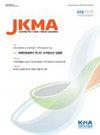使用生物制品治疗哮喘和嗜酸性变态反应性疾病
IF 0.5
Q3 MEDICINE, GENERAL & INTERNAL
引用次数: 0
摘要
背景:哮喘和其他嗜酸性变态反应性疾病是异质性综合征,包括各种内型和表型特征。最近几种靶向生物制品的发展使得这些疾病的异质性病理生理的个性化治疗成为可能。目前概念:美国食品和药物管理局批准用于此类疾病的生物制品主要包括阻断2型炎症途径的单克隆抗体,如免疫球蛋白E、白细胞介素(IL)-5、IL-5受体、IL-4α受体和胸腺基质淋巴生成素。为严重嗜酸性粒细胞过敏性疾病患者选择最佳生物制品的实用策略是患者和医生在可测量的生物标志物、合并症和考虑药物特性和成本的患者偏好的基础上共同决策。讨论与结论:生物制品在慢性嗜酸性变态反应性疾病中的出现,不仅预示着精准治疗的时代的到来,而且通过对每个患者的不同治疗反应,提高了我们对内源性类型的理解。影响各种途径的新生物制品的开发和新的生物标志物的发现将有助于为患有严重无法控制的疾病的患者提供优化的精准医疗。本文章由计算机程序翻译,如有差异,请以英文原文为准。
Treatment of asthma and eosinophilic allergic diseases using biological products
Background: Asthma and other eosinophilic allergic diseases are heterogeneous syndromes encompassing various endotypes and phenotypic characteristics. The recent development of several targeted biological products has enabled the personalized treatment for heterogeneous pathophysiology in these diseases.Current Concepts: Biological products approved by the US Food and Drug Administration for such diseases primarily comprise monoclonal antibodies that block the pathway of type 2 inflammation, such as immunoglobulin E, interleukin (IL)-5, IL-5 receptor, IL-4α receptor, and thymic stromal lymphopoietin. A practical strategy for selecting the optimal biological products for patients with severe eosinophilic allergic diseases is a shared decision-making process between the patient and physician on the basis of measurable biomarkers, co-morbidity, and patient preferences considering drug characteristics and costs.Discussion and Conclusion: The emergence of biological products in chronic eosinophilic allergic diseases has not only heralded an era of precise treatment but has also improved our understanding of the endogenous types through various treatment responses for each patient. The development of new biological products that affect various pathways and the discovery of novel biomarkers will facilitate the provision of optimized precision medicine to patients with severe uncontrolled diseases.
求助全文
通过发布文献求助,成功后即可免费获取论文全文。
去求助
来源期刊

Journal of The Korean Medical Association
Medicine-General Medicine
CiteScore
0.50
自引率
0.00%
发文量
84
审稿时长
4-8 weeks
期刊介绍:
The Journal of the Korean Medical Association (JKMA) is the official peer-reviewed, open-access, monthly journal of the Korean Medical Association (KMA). It contains articles in Korean or English. Its abbreviated title is ''J Korean Med Assoc''. The aims of the Journal include contributing to the treatment of and preventing diseases of public health importance and to improvement of health and quality of life through sharing the state-of the-art scientific information on medicine by the members of KMA and other national and international societies.
 求助内容:
求助内容: 应助结果提醒方式:
应助结果提醒方式:


